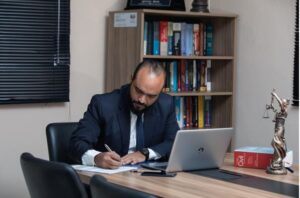No one starts their day expecting to be cuffed, questioned, and shuffled into a courtroom. Yet, for many people in San Antonio, a normal day can spiral into chaos. Criminal charges don’t arrive with a polite knock or a warm smile. They barge in, rearrange your life, and leave you staring down a system that doesn’t care if your only crime was being in the wrong place, at the wrong time, with the wrong people.

What makes matters worse? Deciding to go it alone. Representing yourself in a criminal case is bold, misguided, and bound to get messy. The stakes are too high for guesswork. Your freedom, your record, and your reputation are on the line.
So what do you do when the system throws its weight around, and you’re standing there with nothing but Google searches and panic sweat? You call a professional.
Here are six reasons you should not face criminal charges without a defense Attorney.
1. You Need Someone Who Speaks Legal Language
Courts follow strict rules that most people outside the legal field don’t fully understand. Every word, document, and deadline carries weight, and small mistakes can lead to serious consequences.
A San Antonio criminal defense attorney understands how to navigate this system correctly. They know the legal terms, the correct procedures, and how to present information that the court will take seriously.
Without a defense attorney, you may find yourself overwhelmed by the complexity of the process. Judges and prosecutors won’t adjust the rules because you’re unfamiliar. They expect everyone to follow the same standards, and failing to do so can damage your case.
Moreover, legal proceedings are not only about facts but also about how those facts are argued. A skilled attorney carefully builds your defense and protects your rights throughout the case. They give you the best chance of reaching a fair outcome.
2. You Could Accidentally Incriminate Yourself
Talking too much has never saved anyone in a courtroom. People think they’re helping themselves by explaining, clarifying, or apologizing, but they end up weaving a narrative that the prosecution can twist into a confession.
One misplaced sentence, one shaky detail, and you’ve gone from “misunderstood citizen” to “credible suspect.”

Police officers and prosecutors are trained in interrogation. You are not trained to defend yourself under pressure, especially when your future is on the line. Words that feel harmless to you can be weaponized against you. Even tone and body language get dissected like frogs in a middle school science class. And once something damaging is on the record, it’s nearly impossible to undo.
A defense attorney acts like a filter. They keep you from saying things that shouldn’t be said and guide you toward responses that protect your rights. Their job is to talk for you so you don’t accidentally talk yourself into a worse position.
3. Clean Record Is Worth Fighting For
A criminal record can follow you for the rest of your life. It affects more than just your current situation—it can unexpectedly limit future opportunities. Employers, landlords, and even schools may view a criminal charge as a reason to turn you away, regardless of the circumstances behind it. That is why protecting your record should be a top priority from the start.
A defense attorney understands how damaging a conviction can be, and they work to prevent it whenever possible. Whether that means negotiating for reduced charges, finding legal errors in the case, or seeking options like dismissal or diversion, an attorney will look for ways to protect your future.
Even if the evidence appears compelling, there might be legal ways to avoid having a permanent mark on your record.
4. Court Procedures Can Trip You
It takes more than just appearing in court to handle a criminal case. Without the right legal training, managing the rules and procedures that must be strictly followed can be challenging. There are particular requirements for each step in the process; not meeting them could harm your case.

Judges are not likely to overlook errors resulting from inexperience or confusion because they expect precision and professionalism.
A skilled defense lawyer can follow these guidelines without making mistakes. They know how to properly respond to the court, meet deadlines, and prepare documents. Their expertise helps you avoid needless delays or preventable setbacks that could reduce your chances of a better result.
When you try to manage these procedures independently, the risk of overlooking important details is high. A defense attorney gives you the structure and legal support to stay on track and avoid costly missteps.
5. Evidence Can Be Used Against You
Evidence plays a powerful role in a criminal case but does not always speak for itself. It can support either side, depending on how it is presented and interpreted. Without legal experience, you may not know which pieces of evidence help you or which can be challenged.
Important details can be missed, and even strong arguments can lose their impact if not handled the right way.

A defense attorney knows how to scrutinize evidence. They can question how it was collected, whether it is reliable, and if it should even be allowed in court. They also know how to use favorable evidence to strengthen your defense and weaken the prosecution’s case.
It takes more than just common sense to comprehend evidence. It requires familiarity with legal principles and tactics. A knowledgeable lawyer ensures the evidence is used appropriately, increasing your chances of getting a fair outcome in your case.
6. The Emotional Toll Is Real
Facing criminal charges is a psychological minefield. There’s fear, shame, confusion, and stress—all barreling in at once. You’re not just fighting a legal battle but wrestling with your sanity.
That emotional fog can cloud judgment and lead to poor decisions. And poor decisions in court? They cost you more than a few sleepless nights.
A defense attorney acts as a buffer between you and the full weight of the system. They think clearly when you can’t. They act strategically when you’re tempted to react impulsively. They remind you that you’re more than the charges stacked against you and that there’s a path forward—even when the world has closed in.
Conclusion
The courtroom isn’t a place to test your endurance or improve your skills. It’s a place where words are weapons, rules are strict, and outcomes change lives. Walking in without a lawyer, especially in a city like San Antonio, where the legal machine is fast and loud, is a long shot with considerable risks.
So the next time the law comes knocking and your gut says, “Maybe I can handle this,” do yourself a favor—don’t. Get a professional. Because when freedom’s on the line, self-representation isn’t brave. It’s stupid.







